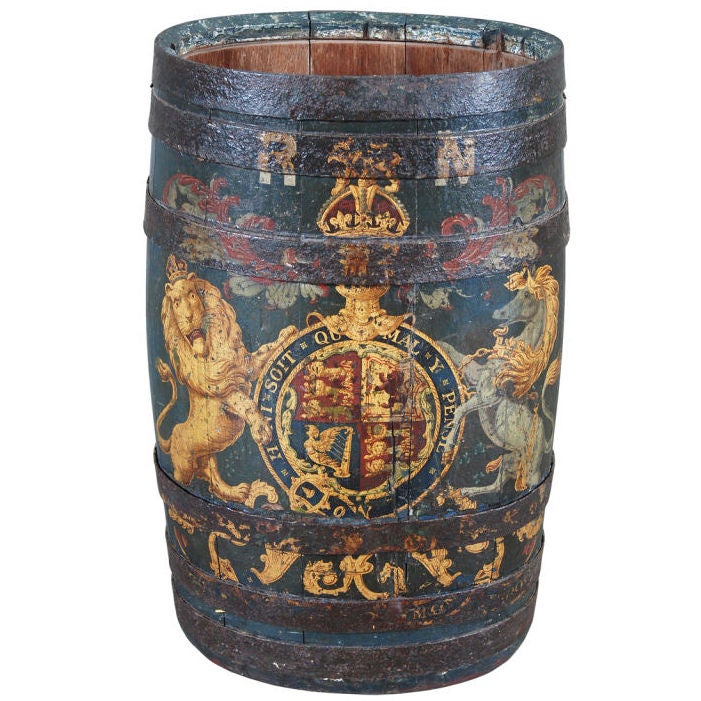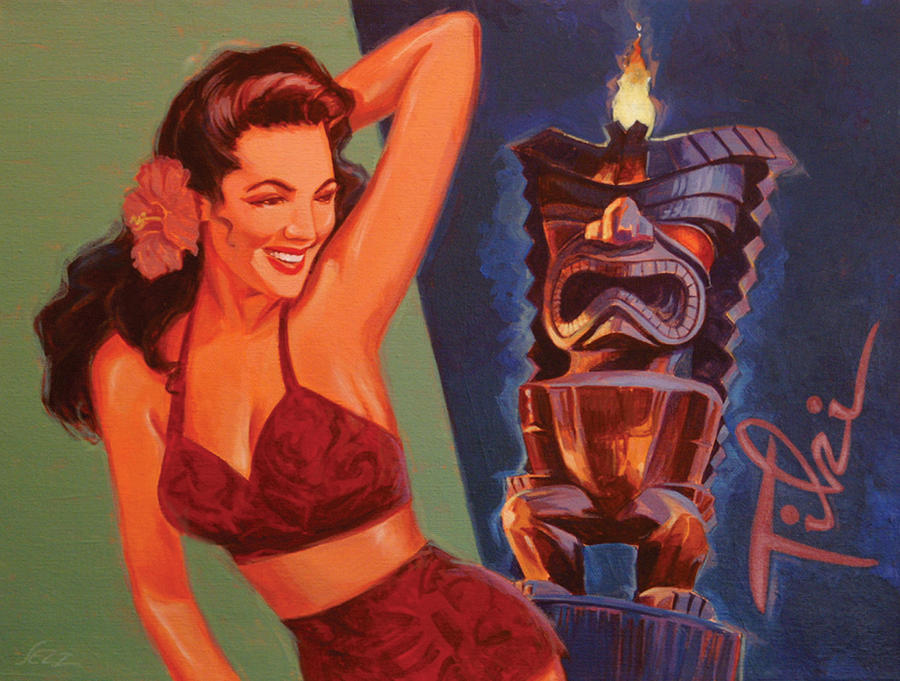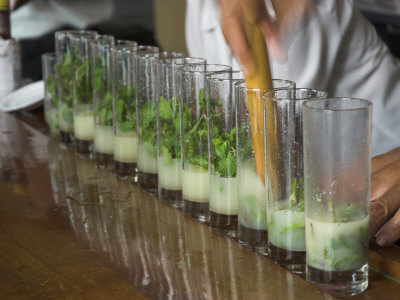Chapter One: Kill-Devil
The simplest definition of rum is distilled sugar cane juice. Whether it comes directly from the cane, from sugar, or from molasses is just one of the variables that make the many varieties of rum different. Sugar was, with a due nod to historian Sidney Mintz, along with tobacco, the foundation of North American economics, the goods that made the Colonies profitable. Someone, perhaps in Barbados, figured out that what Curtis calls the "industrial waste" of the sugar plantation could be made into alcohol, and so not only did North America have a native booze but also another tidy means of making cash. Some called it "rumbullion," meaning "tumult," while others called it "kill-devil." Let's just say that the earliest rum was hard and rough, the moonshine of the Caribbean.
I lead my playlist with a sort of theme song, performed by my favorite folk trio led by Gordon Bok, Maine's premier maritime folk singer. "My Images Come" is an ode to to the many inspirations of the songwriter, with "a bottle of rum" a constant in every verse. It seemed appropriate to acknowledge the slaves that worked the plantations and may in fact have invented rum themselves. For this I turned, naturally, to possibly the best songcatcher in Ethnomusicology, Alan Lomax, but unable to locate anything from Barbados I instead found a couple good songs from Grenada...
1. "My Images Come" by Bok, Muir and Trickett from The First Fifteen Years - Volume II -->
2. "Work Song" by Norman Miller from The Alan Lomax Collection: Caribbean Voyage - Grenada Creole and Yoruba Voices
3. "Roll, Roll, Roll and Go" by Irene McQueen from The Alan Lomax Collection: Caribbean Voyage - Grenada Creole and Yoruba Voices
 |
| Grog barrel from ca. 1790: A tot for the King! |
Chapter Two: Grog
Grog: Rum, water, possibly lime or lemon juice, possibly spices. I like the story that says that grog was named for the grogram coat worn by Vice Admiral Edward Vernon, the officer who introduced the famous grog ration to British Naval tradition in 1740. This date means that, myth and song aside, grog could NOT logically have been the beverage of pirates of either the Buccaneer era or the Golden Age. Morgan, Teach, and the rest most likely chugged their rum straight--real pirattitude. One cocktail pirates apparently did enjoy was "bumbo:" rum, water, molasses, and nutmeg. Grog, on the other hand, was Vernon's means of maintaining Naval morale while decreasing shipboard drunkenness by cutting the booze and preventing scurvy by mixing in citrus juice. It is also, if I may add, a damned fine curative to the symptoms of the common cold. As time progressed, official military inebriation was more and more frowned upon: The ratio went from 2 parts water to 1 part rum to as low as 6 to 1, and finally "Up Spirits" was piped for the last time in 1970.
The Logan side of me cut loose with the music here, full authenticity be damned. There's "All For Me Grog" by local (former) pirate troupe the Budd Bay Buccaneers, a couple tracks from the Pirates movies, our dearly departed "pooped" animatronic pirate, and "Yo Ho Ho and a Bottle of Rum," the ultimate pretend shanty from Treasure Island. Then the true grog: The Naval song about the ration, "A Drop of Nelson's Blood;" a few traditional tunes for the foc's'lemen of Master and Commander; and "Don't Forget Your Old Shipmate," a real British Navy song sung aboard the dear, fictitious Surprise...
4. "All For Me Grog" by Budd Bay Buccaneers from Got Booty?
5. "Jack Sparrow" by Hans Zimmer from Pirates Of The Caribbean: Dead Man's Chest
6. "Drink Up Me Hearties" by Hans Zimmer from Pirates of the Caribbean: At World's End
7. "Pooped Pirate" from Pirates Of The Caribbean (This is from somewhat of a rarity, the anniversary CD of the Pirates ride. Wikipedia says a revised version is available at the parks. Mine came of eBay.)
8. "Yo Ho Ho & a Bottle of Rum (from Treasure Island)" by Toucan Pirates from Buried Treasure of the Toucan Pirates
9. "A Drop of Nelson's Blood" by The Pirates Charles from The Return of David Gale
10. "Folk Medley: O'Sullivans March/The Cuckold Comes Out Of The Amery/Mother Hen/Mary Scott/Nancy Dawson" by Richard Tognetti (Violin), Phillip Ayling (Whistles), Eric Riegler (Uillean Pipes), Jim Walker (Jew's Harp) from Master And Commander: The Far Side Of The World
11. "Don't Forget Your Old Shipmate" by Jerry Bryant and Starboard Mess from Roast Beef Of Old England
 |
| The American rum |
Chapters Three and Four: Flip and Medford Rum
We are a nation built on booze. If the pub was the center of community in Britain, the tavern in the Colonies became the center of dissent, the birthplace of revolution. Men of the Colonies drank ale like water, or, more accurately, instead of water. When the Founding Fathers wanted to really get drunk, they drank rum. Of many tavern concoctions, the most popular was flip: ale, molasses, and rum heated to just off the boil with a loggerhead (in short, a hot poker). Yes, it's weird. Rum started out as an import from the West Indies, but with its popularity it increasingly became a domestic product. The "best" was made in Medford, Massachusetts. The importance of rum to both life and business made the Molasses Act of 1733 and the Sugar Act of 1764 particularly unctuous. Rum led directly and indirectly to uprising, in turn to nationalism, and in turn to nation. Just ask Paul Revere.
I didn't want to be all jingoistic about rum here, but I couldn't really avoid the musically obvious. The British troops play fife and drum. And, well, there's a catchy song about the Revolution from our youth with Saturday morning cartoons...
12. "British Grenadiers" Traditional (Perf. Fifes and Drums) from Barry Lyndon
13. "The Shot Heard 'Round The World" by Bob Dorough from Schoolhouse Rock: America Rock
 |
| The fancy means to group inebriation |
Chapter Five: Planter's Punch
Punch is not so much a recipe as a formula, an idea. Based on a little ditty in the New York Times in 1908, "Planter's Punch" becomes a ratio open to infinite mixological possibilities: one of sour, two of sweet, three of strong, and four of weak. Let's say, for argument or example, that the sour is lime, the sweet is sugar, the strong is rum, and the weak is water. True, that sort of sounds like scientifically specified grog. Yet put the punch in a communal bowl in the middle of the table, and you have both the predecessor to the cocktail and the social center of a new country. Well, until the Civil War proved that we weren't one country, and German immigrants made pale beer what everyone everywhere drank.
I kept this musically brief. I wanted something that was quintessentially 19th century American, acknowledging that as punch evolved into the American popular beverage, African-American music evolved into American popular music. So I turned to old banjo tunes, and for that I had to turn to Tony Trischka. For this musical/alcoholic chapter, follow the formula, and do as follows. Pull out the silver or crystal bowl from the closet, or just get a stock pot. Start with whatever alcohol you have the most of: It could even be wine. Squeeze limes or lemons or Mandarin oranges or what fruit hasn't molded. Open a 7-Up or a ginger ale, or just turn on the kitchen tap. Stir it all up with sugar. Get friends and/or family around the bowl or the pot. Take a turn with the toast. Be merry and think that community is whoever drinks together. That's the definition of punch...
14. "Keemo Kimo/Circus Jig" by Tony Trischka from World Turning
15. "Dan Tucker/Get Along John/Briggs Jig" by Tony Trischka from World Turning
 |
| Like I'd want your lips, anyhow!! |
Chapter Six: Demon Rum
To me, it's the American disorder. The United States at least purports itself as the beacon of liberty, and yet that liberty is founded in Puritanism, by definition the restriction of religious freedom. The separation of church and state is a fallacy; "one nation" under who? Even if we presume that liberty was really about the money--entrepreneurship, free markets, industry, and all that--we are still left with the fact that the pursuit of happiness will always, under the American ideal, be controlled. Slavery, homophobia...alcohol. This schism in the American soul made the nineteenth century tough on rum. With sugar cane running short, American distillers turned to grain, and whiskey--bourbon within certain specifications--became the common hard drink. Meanwhile, with typical American irony, the same brand of zealots that called for emancipation also called for temperance. Rum, simple and easy to remember, was singled out as the ultimate evil. While the Gay Nineties were a grand time to drink, rum had by this time been kicked out of the party, in no small part from that dominance of German-style beer. Then, the Puritans won: Prohibition, 1920.
I found this old Temperance Poem as a podcast in iTunes. As this poem reads, everyone must stand in silence and then down a double shot...
16. "The Lips that Touch Liquor Shall Never Touch Mine" by Harriet A. Glazebrook (c. 1800) from Librivox: Short Poetry Collection
Chapter Seven: Daiquiri
Writers, booze...Hemingway. Cuba. Bacardi. Havana, way before Castro, was where early jet setters and bohemians ran to escape Prohibition. They danced the rumba or they just drank themselves into the gutter, perhaps with delusions of writing the greatest novel of all time. Rum never left the Caribbean, and so when the yanquis came to the islands, rum was king again. The daiquiri is still no more than rum, sugar, and lime--but shaken and strained. It wasn't the only thing Papa swilled. But it was the entry of rum into the cocktail era.
 |
| Rum and lime, all grown up |
Writers, booze...Hemingway. Cuba. Bacardi. Havana, way before Castro, was where early jet setters and bohemians ran to escape Prohibition. They danced the rumba or they just drank themselves into the gutter, perhaps with delusions of writing the greatest novel of all time. Rum never left the Caribbean, and so when the yanquis came to the islands, rum was king again. The daiquiri is still no more than rum, sugar, and lime--but shaken and strained. It wasn't the only thing Papa swilled. But it was the entry of rum into the cocktail era.
I went totally Ethno in this part and pulled up a bunch of traditional tunes from the Greater Antilles. "Lamento Borincano" is perhaps the most poignant song ever from Puerto Rico. "Apágame La Vela" is a merengue from the Dominican Republic, while "Seis Mapeyé" is a kind of "típico" or folk song from Puerto Rico. "De Vasquez Y Bosques" is an old Cuban son. Finally, there's "El Manisero," the street vendor's cry that led to the introduction of Afro-Cuban rhythms to the swing band repertoire and thus to American popular music...
17. "Lamento Borincano" by Canario y su Grupo, fea. Davilita. (I got this, the original recording, courtesy my Ethno mentor, Shannon Dudley. Never knew where he got it from--I assumed old vinyl--but apparently it is now available on this CD.)
18. "Apágame La Vela (Put Out My Candle)" by Nicolá Gutierres, Porfirio Rosario y Santo Peña from Raíces Latinas
18. "Apágame La Vela (Put Out My Candle)" by Nicolá Gutierres, Porfirio Rosario y Santo Peña from Raíces Latinas
19. "Seis Mapeyé" by Cuerdas De Borinquén from Raíces Latinas
20. "De Vasquez Y Bosques (They Went To The Woods)" by Isaac Oviedo y su familia from A Carnival Of Cuban Music - Routes Of Rhythm Volume I
21. "Peanut Vendor (El Manisero)" by Stan Kenton & His Orchestra from Latin Jazz: The Perfect Combination
Chapter Eight: Rum and Coca-Cola
War: bad as a rule, but a good reason to drink. War is also a good excuse for marketing, and Coca-Cola made cash and cultural capital by supplying the troops wherever they went. Mixing rum and Coke likely began well before World War II when American soldiers were in Cuba during the Spanish-American War. Yet it was, in fact, a song that made it famous. "Rum and Coca-Cola" began as a calypso, a Trinidadian song form that typically discussed matters of the day. In this case, Lord Invader wrote a song commenting on how U.S. soldiers, having no actual enemy to fight on Trinidad in World War II, spent their time getting smashed and luring local women with the "Yankee dollar." Then, a comedian on a USO tour caught wind of the popular island tune and eventually got it to the legendary Andrews Sisters. A song that mocked American GI's suddenly became a nonsense song popular with GI's everywhere. I have included both versions. I have also tagged on, out of sheer necessity, a Jamaican mento turned Trinidadian calypso via a New Yorker with roots in Jamaica. Ethnohistory aside, you know the tune. Now try to get it out of your head...
 |
| It's a drink..and it's a hit! |
War: bad as a rule, but a good reason to drink. War is also a good excuse for marketing, and Coca-Cola made cash and cultural capital by supplying the troops wherever they went. Mixing rum and Coke likely began well before World War II when American soldiers were in Cuba during the Spanish-American War. Yet it was, in fact, a song that made it famous. "Rum and Coca-Cola" began as a calypso, a Trinidadian song form that typically discussed matters of the day. In this case, Lord Invader wrote a song commenting on how U.S. soldiers, having no actual enemy to fight on Trinidad in World War II, spent their time getting smashed and luring local women with the "Yankee dollar." Then, a comedian on a USO tour caught wind of the popular island tune and eventually got it to the legendary Andrews Sisters. A song that mocked American GI's suddenly became a nonsense song popular with GI's everywhere. I have included both versions. I have also tagged on, out of sheer necessity, a Jamaican mento turned Trinidadian calypso via a New Yorker with roots in Jamaica. Ethnohistory aside, you know the tune. Now try to get it out of your head...
22. "Rum and Coca-Cola (1944 Single Version)" by The Andrews Sisters from 20th Century Masters - The Millennium Collection: The Best of the Andrews Sisters
23. "Rum And Coca-Cola" by Lord Invader from Calypso Calaloo
24. "The Banana Boat Song (Day-O)" by Harry Belafonte & Tony Scott from Platinum & Gold Collection: Harry Belafonte
 |
| Bikinis, booze, and burning heads! What more can a man ask for? |
Chapter Nine: Mai Tai
The marvelous kitsch that is tiki dates back to the 1930's, when a guy named Gantt styled himself "Don the Beachcomber" and romanticized the South Pacific for the Hollywood elite. His restaurant even weathered World War II, but it was when Monsieur L'Beachcomber opened a location on Waikiki Beach, Hawaii, the ultimate vacation destination of the 1950's, that tiki took off. Meanwhile, the son of a French Canadian in San Francisco, Victor Bergeron, tapped into Gantt's vibe and created the tiki empire known as Trader Vic's. Tiki was the response to the whitewashing of post-war America, yet it was born of the same plastic romanticism that made the Jungle Cruise at Disneyland. But tiki was a bar, and rum plus fruit made a new heyday of the cocktail, head-shaped mugs and all. Both Gantt and Bergeron claim to have created the mai tai: both light and dark rums, curaçao, lime, and orgeat syrup, all shaken and strained. Kitsch aside, it is one hell of a cocktail. So I have for you the one and only master of "exotica," Martin Denny, to play the groovy sounds of the distant isles as the macaws squawk and the torches burn. Long live tiki...
25. "Quiet Village" by Martin Denny from The Exotic Sounds of Martin Denny
Chapter Ten: Mojito
Bacardi is gone from Havana, but not the mojito--mint leaves muddled with sugar and lime juice, to which is added rum, ice, and soda water. The mojito is the drink of Cuba, not the daiquiri, not rum and Coke. And now it is the rum cocktail of the times, thanks to hard marketing. It's a drink of beauty, trendiness aside. But forget about that, and just think of how rum, North American child, has evolved and survived til the age of the mojito. Glance at the shelves in the store: tradition bearers like Pusser's; World War legacy in the name of Sailor Jerry; incredibly refined, aged rums like Ron Zacapa. It's never been a better time to love rum.
In that spirit, I ended the playlist in a party mode. Image Band pumps you up for carnival. The dancehall reggae of Damian Marley shows you modern Kingston, while the reggaeton of Daddy Yankee shows you modern San Juan. And then I bring it back to old Cuba...
27. "Flags in de Air" by Image Band from Comin' Tuff. (Image Band is a great Caribbean band now based in D.C. My dear, old friend Harvey picked this up for me, if I remember right, in the Virgin Islands. Now it doesn't seem to be anywhere.)
28. "Welcome To Jamrock" by Damian "Jr. Gong" Marley from Welcome To Jamrock
29. "El Truco" by Daddy Yankee from Barrio Fino En Directo
30. "Candela" by Buena Vista Social Club from Buena Vista Social Club
31. "Elube Changó (Son Afro)" by Afro Cuban All-Stars from A Toda Cuba Le Gusta
Rum... Read. Listen. Drink.
Rum... Read. Listen. Drink.



Excellent post, Lou!
ReplyDelete